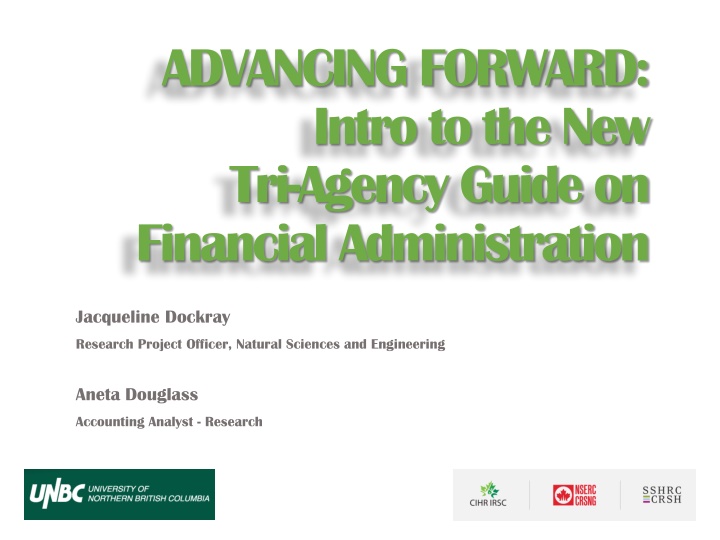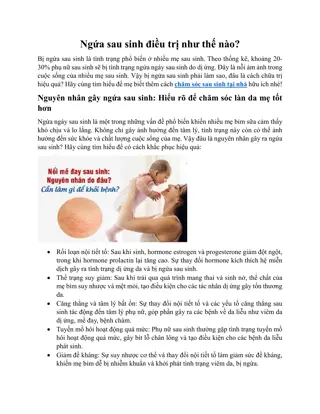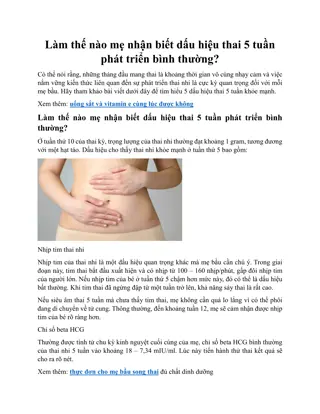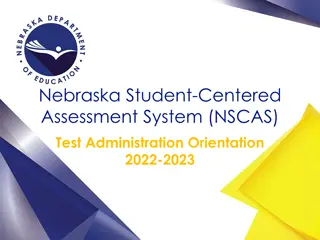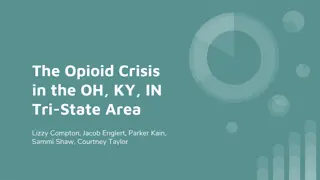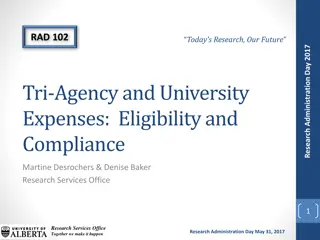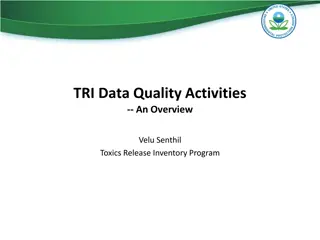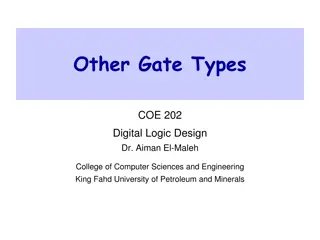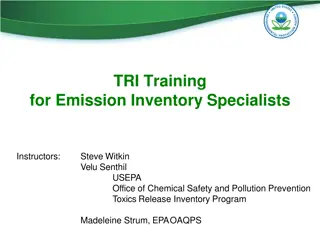The New Tri-Agency Guide on Financial Administration
This guide introduces the key changes in the new Tri-Agency Guide on Financial Administration, highlighting the shift to a principle-based approach, impact on research fund administration, and available resources for implementation. Explore objectives, content details, principles, and the framework for determining expense eligibility under the new guide.
Download Presentation

Please find below an Image/Link to download the presentation.
The content on the website is provided AS IS for your information and personal use only. It may not be sold, licensed, or shared on other websites without obtaining consent from the author.If you encounter any issues during the download, it is possible that the publisher has removed the file from their server.
You are allowed to download the files provided on this website for personal or commercial use, subject to the condition that they are used lawfully. All files are the property of their respective owners.
The content on the website is provided AS IS for your information and personal use only. It may not be sold, licensed, or shared on other websites without obtaining consent from the author.
E N D
Presentation Transcript
ADVANCING FORWARD: Intro to the New Tri-Agency Guide on Financial Administration Jacqueline Dockray Research Project Officer, Natural Sciences and Engineering Aneta Douglass Accounting Analyst - Research
OBJECTIVES OBJECTIVES By the end of this session, you should be able to use the new Guide Guide by: Understanding the key differences between the new and the old Tri- Agency Guide on Financial Administration (TAGFA), including the four principles and other important changes Understand the impact of the new TAGFA on the administration of the Tri-Agency research funds at UNBC Navigate available resources for more information about the new TAGFA implementation
CONTENT CONTENT Part 1: About the Guide Part 2: Use of Grant Funds Part 3: TAGFA Principles and Directives Part 4: Administering Institution s Policies and Directives Part 5: Tri-Agency Resources
Objectives of the Principles Objectives of the Principles- -Based Guide Based Guide Streamline Streamline and simplify simplify the administration and use of grant funds Promote and support sound judgment judgment and due diligence Foster a balance balance between control and flexibility Lessen Lessen administrative burden Allow for more efficient efficient processes Harmonization Harmonization of Tri-Agency policies and guidelines No discretion No discretion to depart from these principles and directives
What has changed? What has changed? Shift from prescriptive list of eligible and ineligible expenses to a principle-based approach under the new Guide. New Guide provides framework for institutions to determine eligibility of expenses maximizing the use of existing policies, processes and controls. In general, anything eligible under the old Guide will continue to be eligible as long as the item or service respects the four key principles and directives as outlined in the TAGFA.
Roles & Responsibilities Roles & Responsibilities Slide taken from U of Toronto presentation https://research.utoronto.ca/media/440/download
Order of Precedence and Interpretation Order of Precedence and Interpretation Steps, IN ORDER, for determining the eligibility of expenses: 3. The Program/Funding Opportunity literature 1. The Four Principles 4. The Institution s Policies and Directives 2. The Relevant Directive Details Every step from this assessment process should be executed before making eligibility determination
Part 3: TAGFA Principles & Directives
PRINCIPLES Grant expenditures MUST: 1. Contribute towards the direct costs of the research/activities direct costs of the research/activities 2. Not be provided by the administering institution provided by the administering institution 3. Be effective and economical effective and economical 4. Not result in personal gain personal gain
PRINCIPLES on the Use of Grant Funds PRINCIPLES on the Use of Grant Funds Grant expenditures MUST: 1. Contribute to the direct costs Contribute to the direct costs of the research/activities for which the funds were awarded, with benefits directly attributable to the grant What are DIRECT COSTS? Essential expenditures that would not have been incurred had the grant not been undertaken Accordingly, they can be directly assigned to the grant activities with a high degree of accuracy
PRINCIPLES on the Use of Grant Funds PRINCIPLES on the Use of Grant Funds Grant expenditures MUST: 2. Not be provided by the administering institution Not be provided by the administering institution to their research personnel Provided by the administering institution ? If an administering unit normally provides a good or service, it cannot be charged to the grant Tri-Agencies are mindful that what is provided by an institution can vary both across and within institutions
PRINCIPLES on the Use of Grant Funds PRINCIPLES on the Use of Grant Funds Grant expenditures MUST: 3. Be Be effective and economical effective and economical Effective and economical ? It achieves the intended outcome with due regard for minimizing cost by avoiding unnecessary expense Optimal use of the funds; does not necessarily mean the lowest cost .
PRINCIPLES on the Use of Grant Funds PRINCIPLES on the Use of Grant Funds Grant expenditures MUST: 4. Not result in Not result in personal gain personal gain for members of the research team for members of the research team Personal Gain ? A benefit or advantage to a particular person rather than to the grant-funded research/activities
DIRECTIVES on Certain Expense Types DIRECTIVES on Certain Expense Types DIRECTIVES: What are they? Mandatory Requirements Provide a framework to make decisions Allow for sound judgment and due diligence Employment and Compensation Expenses Goods and Services Travel and Travel-Related Subsistence Expenditures Hospitality Expenses Gifts, Honoraria, Incentives
DIRECTIVES: Employment & Compensation DIRECTIVES: Employment & Compensation ELIGIBLE EXPENSES ELIGIBLE EXPENSES Individuals employed to work on funded research/activities can be compensated from grant funds (exceptions exceptions: see Ineligible Ineligible section below* *) International Researchers (employer must attest, by letter, that the individual is not being compensated by the employer for the time spent on the grant) Mandated compensation benefits Only the portion of mandated severance pay for the period the individual worked on the current grant the current grant period the individual worked on INELIGIBLE EXPENSES * Grant recipients or individuals who conduct research independently as part of the terms and conditions of their employment * Individuals expected to work on the funded research/activities free of charge * Individuals employed and compensated by another organization for the time spent on the funded research/activities ** ** Grant funds can be used to reimburse the organization for costs incurred in compensating the individual for time spent on grant activities
DIRECTIVES: Employment & Compensation DIRECTIVES: Employment & Compensation Test for Understanding Test for Understanding For each of the following statements, determine if the expenditures would be an appropriate use of grant funds under the Employment and Compensation directive? a) Salary paid to an individual who is employed full-time with a local counseling organization to provide related services to the grant recipient s funded research project. b) Compensation from grant funds to an international researcher providing services on the grant recipient s project. c) Compensation to a PhD student for work conducted on two different funded research projects. d) Compensation to an independent researcher from another research team collaborating on the grant recipient s funded research project. PRINCIPLES PRINCIPLES Contribute towards direct costs of the research/activities Not be provided by the administering institution Be effective and economical Not resulted in personal gain
DIRECTIVES: Goods & Services DIRECTIVES: Goods & Services ELIGIBLE EXPENSES ELIGIBLE EXPENSES Goods and services expenditures, in accordance with the four principles INELIGIBLE EXPENSES Consulting Fees to: Grant recipients or individuals who conduct research independently as part of the terms and conditions of their employment Individuals expected to work on the funded research/activities free of charge
DIRECTIVES: Goods & Services DIRECTIVES: Goods & Services Test for Understanding Test for Understanding For each of the following statements, determine if the expenditures would be an appropriate use of grant funds under the Goods and Services directive? a) Office and stationery supplies not normally provided by the administering institution. b) Grant recipient wants to use her own company to translate documents from the research project. c) The costs associated with regulatory compliance to provincial or municipal regulations and by-laws. d) Consulting fees for the services rendered by a statistician on a project. PRINCIPLES PRINCIPLES Contribute towards direct costs of the research/activities Not be provided by the administering institution Be effective and economical Not resulted in personal gain
DIRECTIVES: Travel & Travel DIRECTIVES: Travel & Travel- -Related Subsistence Related Subsistence ELIGIBLE EXPENSES ELIGIBLE EXPENSES All travel and travel-related subsistence claimed in accordance with UNBC relevant policies and procedures Such expenditures, including reasonable out-of-pocket expenses, can be claimed for the grant recipient and other individuals who contribute to the funded research/activities. For claimants other than the grant recipient, the affiliation with the funded research/activities must be specified Expenditures must be authorized by the right level of authority INELIGIBLE EXPENSES Alcoholic beverages
DIRECTIVES: Travel & Travel DIRECTIVES: Travel & Travel- -Related Related Subsistance Subsistance Test for Understanding Test for Understanding For each of the following statements, determine if the expenditures would be an appropriate use of grant funds under the Travel and Travel-Related Subsistence directive? a) A car rental for research travel related purposes. b) Purchase of a travel Visa. c) Airfare for a grant recipient to discuss research findings with out-of-town members of the project team. d) Grant recipient is submitting expenses for rainwear necessary for their family member to visit the research project site. PRINCIPLES PRINCIPLES Contribute towards direct costs of the research/activities Not be provided by the administering institution Be effective and economical Not resulted in personal gain
DIRECTIVES: Hospitality DIRECTIVES: Hospitality ELIGIBLE EXPENSES ELIGIBLE EXPENSES Hospitality costs must be directly related to the funded research and be incurred for: Networking purposes provided in the context of formal courtesy or as a form of cultural respect; Activities in the context of assemblies or gatherings that facilitate and contribute to achieving the research objectives; Where one or more of the individuals participating is not a member of the research team and not involved in the day-to-day funded research/activities INELIGIBLE EXPENSES Alcoholic beverages Costs incurred for interactions between participants involved in the day-to-day funded research/activities
DIRECTIVES: Hospitality DIRECTIVES: Hospitality Test for Understanding Test for Understanding For each of the following statements, determine if the expenditures would be appropriate use of grant funds under the Hospitality directive? a) Cost of catering for a workshop without presentations or outcomes with collaborators from partners organizations. b) Cost of groceries for a meal the grant recipient is hosting for visiting scholars to discuss new methodologies used for the funded research. c) Cost of catering for a Christmas party the grant recipient is hosting for their laboratory team. d) Grant recipient is having dinner with another faculty member not involved with their grant to discuss hiring a new lab member. PRINCIPLES PRINCIPLES Contribute towards direct costs of the research/activities Not be provided by the administering institution Be effective and economical Not resulted in personal gain
DIRECTIVES: Gifts, Honoraria & Incentives DIRECTIVES: Gifts, Honoraria & Incentives ELIGIBLE EXPENSES ELIGIBLE EXPENSES Gifts, honoraria and incentives can be offered to an individual/group: when participation is voluntary as a THANK YOU for a service for which fees are not traditionally paid as a token of appreciation, respect and/or goodwill when prescribed by cultural heritage/established traditions as a formal courtesy INELIGIBLE EXPENSES Gifts, honoraria and incentives cannot be offered to: Tri-Agency grant recipients a member of a grant team *The provision of gifts and incentives to participants requires prior approval of the appropriate *The provision of gifts and incentives to participants requires prior approval of the appropriate Research Ethics Research Ethics Board Board
DIRECTIVES: Gifts, Honoraria & Incentives DIRECTIVES: Gifts, Honoraria & Incentives Test for Understanding Test for Understanding For each of the following statements, determine if the expenditures would be an appropriate use of grant funds under the Gifts, Honoraria and Incentives directive? a) A gift for an Elder invited to open a research conference with an opening prayer. b) An honorarium for a local artist invited to prepare a piece of artwork for display at a conference. c) A cash donation made to a cultural site for the use of their facilities to conduct research activities. d) The provision of a $20.00 gift card to an individual as an incentive for their participation in the funded research study. PRINCIPLES PRINCIPLES Contribute towards direct costs of the research/activities Not be provided by the administering institution Be effective and economical Not resulted in personal gain
Part 4: Administering Institution s Policies and Directives
EDI EDI Equity, Diversity and Inclusion Equity, Diversity and Inclusion UNBC is responsible for recognizing the importance of equity, diversity and inclusion in its policies and practices as stated in the Agreement on the Administration of Agency Grants and Awards by Research Institutions. All administering institutions that accept agency funding must make concerted efforts to develop and implement policies and procedures that advance the goals of EDI in the use of grant funds, to achieve equitable participation in the research system. Grant recipients are responsible for ensuring that they carry out their grant activities in accordance with the EDI policies and practices of their administering institutions.
Institutional Policies Institutional Policies Work in Progress: GAP Analysis to identify gaps and changes between the old Guide, the new Guide and current UNBC policies, processes and guidelines For situations where the new guide is silent, institutional policies will apply. When in doubt, the MOST stringent policy always applies. When in doubt, the MOST stringent policy always applies.
Part 5: Tri-Agency Resources
Supporting Resources and Tools Frequently Asked Questions Roles and Responsibilities Virtual Guidance Tool CAUBO Best Practices
Contact Information Aneta Douglass Finance @ 26534 email: Aneta.Douglass@unbc.ca Phone: 250-960-6534 Jacqueline Dockray Office of Research @ 26357 email: Jacqueline.Dockray@unbc.ca Phone: 250-960-6357
